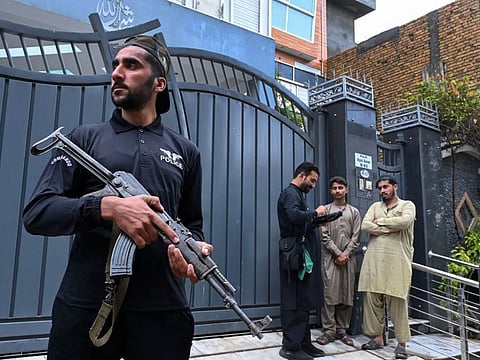Pakistan’s population soars to 241 million
2023 census reports a population increase of over 35 million in the last 6 years

Islamabad: Pakistan’s population has reached a staggering 241.49 million, according to the results of the 7th Population and Housing Census 2023.
The results of the country’s first digital census were shared by the Pakistan Bureau of Statistics (PBS) on August 5.
The census, which began on March 1, 2023, was a significant undertaking to accurately capture the demographic landscape of the nation. Conducted by PBS, the census has revealed an annual population growth rate of 2.55% since the last census conducted in 2017.
The 2023 census marks an increase of more than 16 per cent since the last population census in 2017. This means 35 million more people in less than six years.
Pakistan is the fifth most populous nation only after Indonesia, the United States, China, and India.
More than 61 per cent or 147.6 million Pakistanis reside in the rural region while the urban population is 93.7 million or 38.82 per cent.
Khyber Pakhtunkhwa (KP) province is the region with the largest rural population with nearly 85% residing in rural areas.
Balochistan comprises 69% of rural residents while Punjab accounts for 59% of rural inhabitants. In contrast, Sindh has the highest percentage of urban dwellers, making up 53% of its population.
Which province is the most populous?
Punjab emerged as the most populous province with 127.68 million people in the latest census as compared to 109 million in the 2017 survey.
Pakistan’s southern province of Sindh reported 55.69 million people while the population in KP has swelled to 40.85 million.
The population of Balochistan, Pakistan’s largest but least populated province, has now reached 14.89 million.
Islamabad Capital Territory (ICT) witnessed a demographic change from 2.01 million in 2017 to 2.36 million in 2023.
Highlights
• Total population: 241.4 million • Punjab: 127.6 million • Sindh: 55.6 • Khyber Pakhtunkhwa: 40.8 million • Balochistan: 14.8 million • Islamabad (ICT): 2.3 million
‘Largest digitization exercise of South Asia’
The 2023 census “is historic as this largest digitisation exercise of South Asia was planned in the shortest span of time, just 18 months” the PBS said in its statement.
It was the first time the population was counted digitally using tablets and the citizens were given the facility of self-enumeration. The census also provided an economic frame to identify the size of economic clusters across the nation and all structures were geo-tagged for enhanced monitoring. Stakeholders were granted access to online monitoring dashboards during the process.
This crucial data enables governments to allocate funds and assistance to provinces, districts, and localities and aids in the re-appropriation of National Assembly seats, the bureau said.
Policies needed to address population growth
The census findings were approved by the Council of Common Interest (CCI) presided by Prime Minister Shahbaz Sharif and attended by chief ministers of all provinces. PM Sharif called an increase of 35 million people in six years a “cause for concern and a challenge” stating that the “population growth is more than Pakistan’s economic growth.” The increasing population will be a significant challenge in the future.
“We must not only curb population growth but also boost economic development to tackle these challenges,” he said.
Experts say that rapid population growth adds to numerous challenges as it leads to increased expenditures on health, education, and basic necessities of life. It also puts immense pressure on natural resources, such as food, water, energy, and land. The situation is particularly alarming in Pakistan considering the extent of poverty. Pakistan is ranked 161 in the UN Human Development Index 2022 out of 191 countries.
Could new census delay elections in Pakistan?
The general elections in Pakistan, due to be held by October 2023, could possibly face a delay following the approval of the seventh census.
Law Minister Azam Nazeer Tarar told Geo News TV that it could take about four months to complete the process of a census and draw new constituency boundaries.
The minister said that the CCI meeting had a “consensus to hold elections under the new census.”
The move has raised concerns among the opposition. Sharif’s term is set to expire on August 12, and a caretaker government will take over to hold the elections within three months.
Young voters are poised to play a crucial role in determining the outcome of the upcoming elections as Pakistanis between 18 and 35 years old make up a significant chunk of the electorate.
Sign up for the Daily Briefing
Get the latest news and updates straight to your inbox


